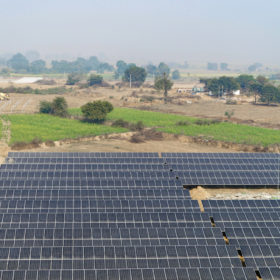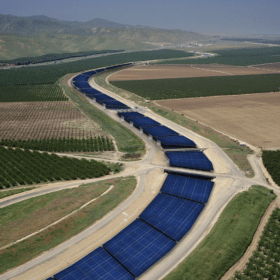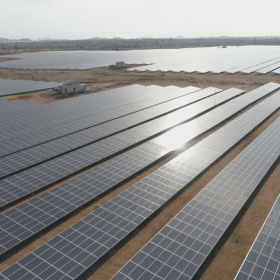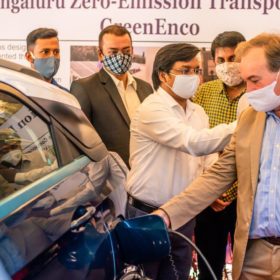Uttar Pradesh tenders 75 MW grid-connected solar capacity
Global bids are invited to develop an aggregate 75 MW of grid-connected solar power projects with an upper tariff ceiling fixed at INR 3.00/kWh for the entire power purchase duration of 25 years. The projects are to be installed in the Uttar Pradesh Solar Park on a ‘build-own-operate’ basis.
Solar canals already competitive with ground-mounted PV
U.S. researchers have assessed the technical and economic feasibility of solar canals in California and have found that their LCOE is already close to that of ground-mounted solar plants. Three different project configurations were analyzed for eight different sites across the California network of canals.
Sungrow unveils 325 kW string inverter
The device will go into mass production in the second half of this year. It features an efficiency of 99.01% and is claimed to be the most powerful string inverter ever launched on the market to date.
BHEL secures its first overseas EPC contract for grid-connected solar plant
The state-run has been awarded an 8 MWac grid-connected solar power plant in Mauritius on an engineering, procurement, and construction (EPC) basis.
NTPC enlisting EPC bidders for ground-mount and floating solar plants
The enlisted players will be invited to participate in the upcoming tenders for the installation of floating and ground-mounted solar power projects. April 6 is the deadline to submit applications for enlistment.
Renewables’ share in electricity generation must grow 55-fold for India to achieve net-zero emissions by 2050
A new report presents four alternative scenarios for India to achieve net-zero emissions, highlighting that the effort required would be very high for a scenario with 2030 as a peaking year for emissions and 2050 for net-zero.
India’s $122bn energy stimulus spending may benefit fossil fuels most
A report says India’s energy investment commitments over the last 14 months largely feature measures for power transmission and distribution that could benefit greenhouse-gas-producing fuels more than renewables.
Adani Green to acquire Canadian developer SkyPower Global’s 50 MW solar asset in India
The Indian developer has signed an agreement with the Canadian developer to acquire its 50 MW Telangana solar project at an enterprise value of around INR 317 crore.
The long read: Central Asia’s solar awakening
Uzbekistan is providing a model for solar development in Central Asia as it rolls out its first large-scale projects. With the support of multilateral financial institutions, the government is prioritizing its electrical infrastructure as it pursues economic development goals. And as Amjad Khashman reports, the engagement of developers from fossil-fuel- rich neighbors in its solar projects points to a bright, renewable future for the region.
IISc sets up off-grid EV charging station powered by Vikram Solar modules
The Indian Institute of Science (IISc), Bangalore has set up a solar-powered charging station to conduct the system’s impact assessment. The system—designed by UK-based renewable energy advisor GreenEnco—uses Vikram Solar’s 16 mono PERC solar modules of 400 Wp each, a hybrid inverter, and battery storage.















